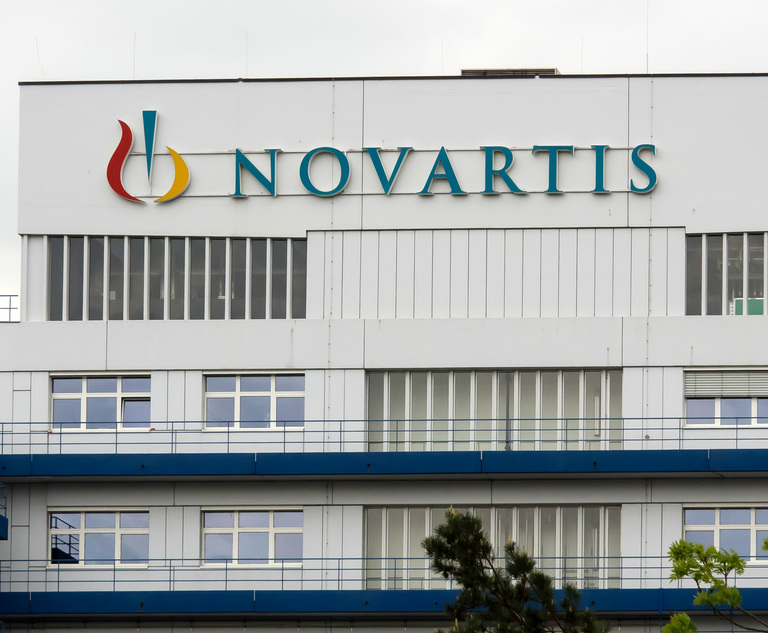The New Jersey Appellate Division upheld a jury’s verdict of $1.8 million and a judge’s award of $1.5 million in attorney fees for a former Novartis employee fired after blowing the whistle on the purchase of a report from one of the company’s distributors that she believed constituted a kickback.
The former employee, Min Amy Guo, was fired after raising concerns that her employer could be in violation of the Anti-Kickback Statute, according to an opinion issued by the Appellate Division.
Guo had been employed by Novartis since 2008 as senior director of a new health economics outcome research department within the oncology division.
While Guo was employed with Novartis, the U.S. Department of Justice brought a lawsuit against the company which alleged violations of both the False Claims Act and the Anti-Kickback Statute, according to the opinion. The suit was settled and a corporate integrity agreement was established which resulted in Novartis providing training programs for employees regarding compliance with the agreement and the FCA and AKS.
In June 2012, approval for a new indication of use for a drug was pending for a breast cancer treatment called Afinitor. While the approval remained pending, McKesson Corp. proposed a study to examine the existing off-label use of the drug by doctors for breast cancer at a cost to Novartis of $248,500, according to the opinion.
Novartis does not actually sell any products directly, but instead sells to firms such as McKesson, which, in turn, sell to pharmacies. When Guo became aware of the potential study, she sent an email to her supervisor, Steven Stein, and to Christi Shaw, director of oncology, to state her belief that the study might be in violation of Novartis’ CIA and unlawful, according to the opinion. After she continued to pursue her belief that the study was a risk for her company, she was told to “back off” by a supervisor, Ling Wu.
Later in July 2012, some of Guo’s subordinates approached her with concerns about the proposed study. Guo brought the concerns to Wu the following week and was told to report the concerns to the ethics and compliance department, which she did the same day. As a result, an investigation was opened which, according to the opinion, revealed Guo had directed subordinates to evade the legal and compliance departments with regard to two other studies.
In the meantime, the proposed study in question was dropped, according to the opinion. However, the investigation revealed a number of violations of company policy and other transgressions by Guo. An internal review committee for Novartis recommended retraining and other disciplinary measures for every other employee involved in the investigation except Guo. The IRC instead recommended she be fired, according to the Appellate Division’s opinion.
Although her supervisors formally requested a reconsideration and appealed to a global internal review committee, Guo was ultimately terminated in July 2013. In 2014, Guo filed a complaint against Novartis which alleged violation of the Conscientious Employee Protection Act and common law, according to the opinion.
At trial, the jury returned a verdict in Guo’s favor for $1,816,040 on her CEPA claim. However, the jury also awarded Novartis $345,360.79 on its counterclaim for unjust enrichment. The jury verdict also denied any punitive damages to Guo.
On appeal, Novartis argued that the trial court erred in finding there was sufficient evidence to infer retaliation against Guo.
“We reject these arguments and agree with the judge that evidence of other disciplinary actions, the timing and outcomes of those actions, and evidence that defendant resented plaintiff’s holding up the approval process for an important and financially beneficial proposal, sufficed to support an inference of retaliation,” the Appellate Division wrote. “The jury was not bound to simply accept defendant’s evidence, considerable though it may have been, at face value. There was enough for the jury to determine that the retaliation and not plaintiff’s misconduct was the reason plaintiff was terminated.”
According to the per curiam opinion, the trial court judge awarded Novartis $8,466 in attorney fees for the plaintiff’s disruptive conduct during trial. Guo was awarded $1,531,434.54 in attorney fees and costs on her CEPA claim.
“Both parties next take issue with plaintiff’s attorney fee award,” stated the opinion. “Defendant asserts that the award was excessive, while plaintiff argues that the judge abused his discretion in reducing the base award in various respects, in limiting the enhancement of that award, and in declining to grant a supplemental fee application.”
“We reject the parties’ arguments and find the award of attorney’s fees were well within the judge’s discretion,” stated the opinion.
“The judge also reasoned that punitive damages were available in a CEPA lawsuit specifically to punish and deter the retaliatory conduct at issue in that statute and that the CIAs, which documented transgressions of unrelated statutes, were irrelevant on that point,” stated the opinion. “A trial judge’s determination as to the relevance and consequent admissibility of evidence rests within its broad discretion and will not be disturbed on appeal absent its palpable abuse of that discretion.”
“Here, nothing in the CEPA statute suggests its authorization for punitive damages is any broader than logic would dictate—as punishment for conduct specifically violating that statute, N.J.S.A. 34:19-5—and the PDA enumerates for consideration in setting an award characteristics exclusively of the conduct that caused the plaintiff harm, not any broader wrongdoing. N.J.S.A. 2A:15-5.12(b) to (c),” concluded the opinion. “In light of that standard, we discern no abuse of discretion.”
Judges Michael J. Haas, Hany A. Mawla, and Stephanie Ann Mitterhoff affirmed the trial court decisions in the matter.
John B. McCusker, formerly of McCusker, Anselmi, Rosen & Carvelli and now a partner with Duane Morris, is counsel for Novartis.
“We are disappointed the New Jersey Appellate Court upheld the entirety of the trial court’s decision. In doing so, the Appellate Court decided to let the jury’s verdict stand in favor of Ms. Guo on her CEPA (Conscientious Employee Protection Act) claim against Novartis,” stated Novartis in an email to Law.com. “We are not surprised to see that the Appellate Court upheld the jury’s determination that Ms. Guo violated company policy, entitling Novartis to the monies due under its unjust enrichment counterclaim.
“While taking some time to fully comprehend the Appellate Court’s decision, we continue to believe that there was no evidence to support a judgment against Novartis, and we will pursue all options to address the outcome in this case,” the statement continued.
Counsel for Guo, James K. Webber of Webber McGill, declined to comment for this story.
NOT FOR REPRINT
© 2024 ALM Global, LLC, All Rights Reserved. Request academic re-use from www.copyright.com. All other uses, submit a request to [email protected]. For more information visit Asset & Logo Licensing.


 Offices of a Novartis production facility in Schweizerhalle, Switzerland.
Offices of a Novartis production facility in Schweizerhalle, Switzerland.





